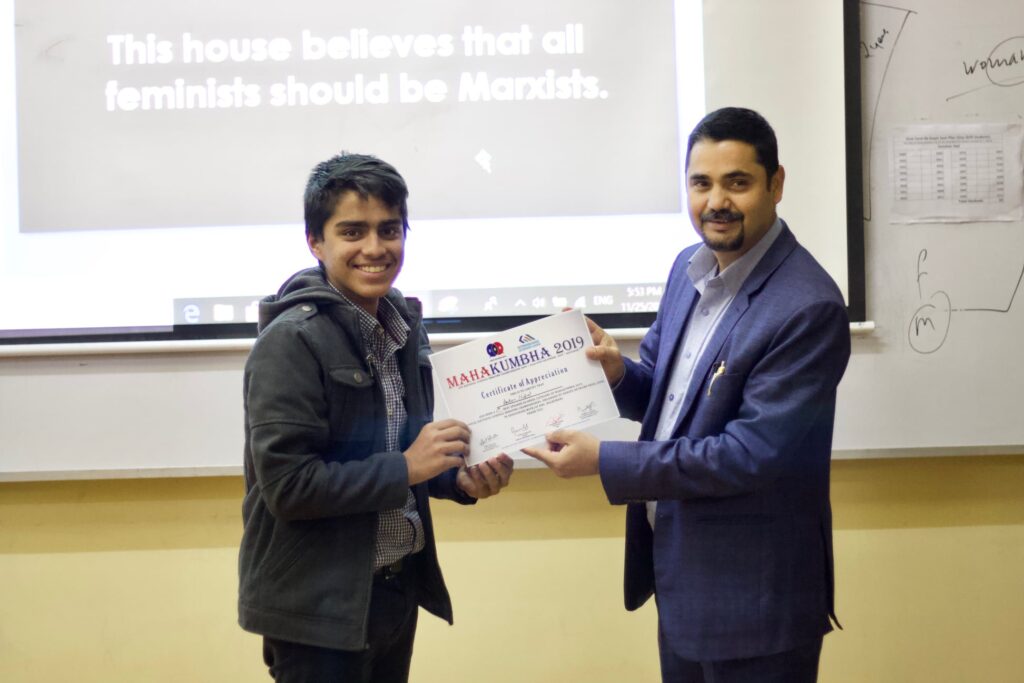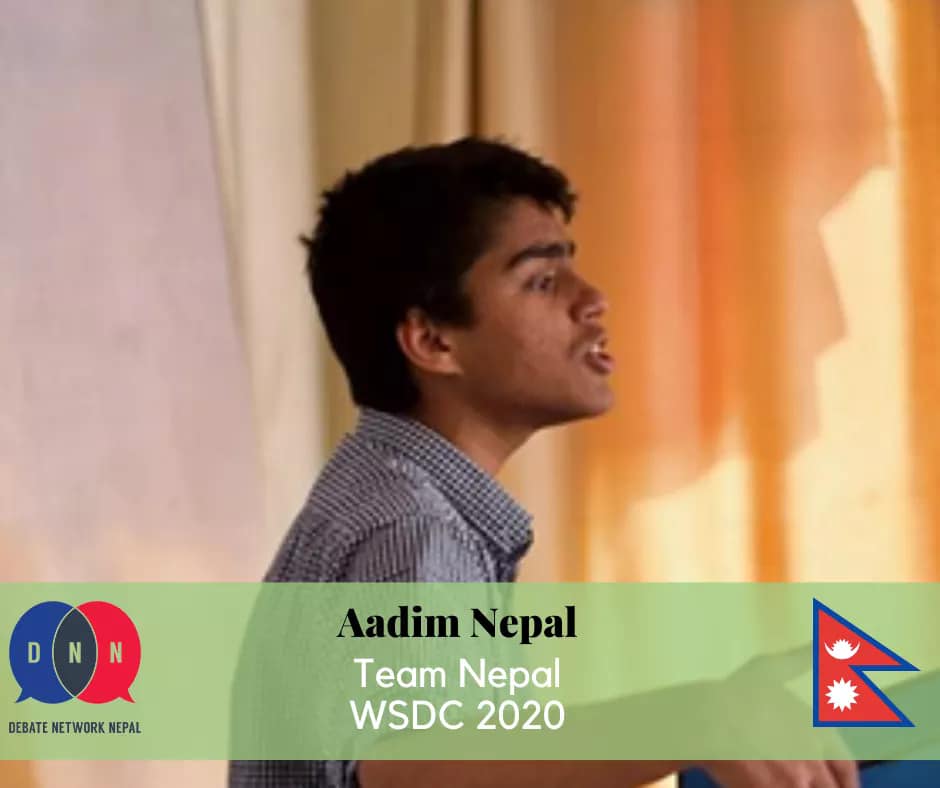So there I was, a tenth-grade student, when I first heard about parliamentary debating from my seniors. They were all hyped up about participating in the RBS Debates 2018 and needed a school team. Since none of us had any experience in parliamentary debating, our school coordinator relied on stereotypes. He thought I, being the studious kid, would fit perfectly as the demanding third speaker. Looking back, I realize it wasn’t fair to my more skilled friends, Grishma and Tessa, who were excellent public speakers. But that’s how things played out.
The tournament was a fun experience, but my competitive mind couldn’t handle the loss. I wasn’t happy with my low ranking in the speaker points and overall team tab. Frustrated, I couldn’t accept that we didn’t break and that I couldn’t leave a mark at that tournament. That’s when my journey in debating truly began. I was determined to prove the team and speaker tabs wrong and make it to the national debate team of Nepal. Naive as I was, it became my driving force.
My biggest challenge throughout this journey was the language barrier. Unlike Grishma and Tessa, English wasn’t my first language, and I struggled to express myself clearly. I often stumbled over my words and failed to convey my thoughts effectively. Coming from an average ESL background, this language barrier posed a significant hurdle. I knew that if I were already a confident English speaker, my debating skills would have improved exponentially. But that wasn’t the case, and English remained a major challenge for me.

To overcome this obstacle, I started practicing speeches in front of the mirror at night and talking to myself while walking. Slowly but surely, I noticed improvements in my English vocabulary. It wasn’t as good as some of the prominent figures in the Nepali debating circuit, and it still isn’t comparable to the likes of Pragyan Dai and Saurav Dai, known for their eloquent debating abilities. But I was getting better, able to convey at least half of what I meant. I wasn’t there yet, but I was making progress. The recognition I received as the “Fellow of the Batch” at Kosedhunga provided me with the initial motivation to keep going.
During Kosedhunga, I had the chance to meet Shuvam and Larisha. Both were seasoned and fluent speakers, and I’m glad they agreed to team up with me. At the time, I believed I was the less fluent speaker but had more resources. However, resources meant little if I couldn’t express myself fully. Surprisingly, we performed exceptionally well at RBS Debates 2019. My hard work paid off, and I was ranked as the 2nd best novice speaker and the 5th best open speaker. We even earned a ballot in the quarterfinals against the current WSDC Team Nepal. I was thrilled that a novice team like ours could challenge the experienced national debate team. Although we lost with a 2-1 split decision, it was a close call. I could sense the WSDC team worrying about the possibility of losing to us. This tournament motivated me to continue climbing the ladder toward the national debate team.
My debate performances, however, remained sporadic. Sometimes I would deliver an impressive 80-point speech, while other times it would be a disappointing 72-point speech. After RBS Debates, I participated in Mahansangram and didn’t perform well. Despite reaching the quarterfinals, I felt something was off in my approach. I was visibly frustrated. The same feeling persisted during the Chelsea Debate Fest. I struggled to approach the motions correctly, and my English-speaking ability continued to be a major issue. It was disheartening to see my colleagues speak so fluently while I kept struggling with the same thing over and over again. It was difficult to express myself fluently and convey the depth of my thoughts. I attributed part of this challenge to my upbringing, the environment I grew up in, and the influence of my friends.
In school, my friend circle wasn’t particularly strong in English speaking. Until grade 5, we often spoke broken English, and afterward, everyone just switched to Nepali. I often wondered how different things would have been if I had studied at Rato Bangala School, where fluency in English would have come more naturally. Changing the core of my upbringing was an uphill battle, and it disheartened me to see others speak so effortlessly while I struggled to put my thoughts into words. In every round, I believed I would win because I had excellent arguments written down, but it was all useless if I couldn’t convey them effectively to the audience.
I realized I needed to change my approach. So, I started recording my speeches and seeking feedback from others. I would watch World Universities Debating Championship (WUDC) round videos, spend 30 minutes prepping based on the motion, listen to the Opening Government speaker, and give an Opening Opposition speech. Then, I would compare my speech to the one in the video. This method helped me improve my framing and adapt better to the challenges. Although I still stumbled at times, I gradually became more proficient.

I and my teammate Senchen performed really well at the Kathmandu World Debates 2019 where we reached the opens grand finals. After this remarkable experience, I gained a significant boost in confidence. Although the tournament did not turn out to be as competitive as anticipated, it still featured teams from outside Nepal, and our Chief Adjudication Panel consisted of world-class individuals. Reaching the grand finals made me feel like I was finally on an upward trajectory.
One of my long-standing goals was to participate in the Mahakumbha tournament, as it was the event that selected debaters for the Nepal national team. I had invested considerable effort into my preparation and was determined to succeed. I remember sneaking out of my Budhanilkantha School’s hostel at midnight, crawling under the library to catch internet access and download resources and debate videos for preparation. It was technically against the rules, and I could have faced suspension if caught. But my desire to learn and excel outweighed the risk. I was content with my performance, even though I didn’t necessarily agree with the verdict in the quarterfinals. It was a lesson in acceptance, even when things didn’t go as expected. Despite the disappointment, I emerged as the overall 4th Best Speaker in the tournament and a top contender for the Nepal national debate team.

The selection process for the National Debate Team was rigorous. I gave a mixed performance, with ups and downs throughout the three rounds. It was hard to determine whether I was happy or sad with my overall performance, but I decided not to stress myself out. Regardless of the results, I resolved to accept them. When the results came out, I found myself on the waitlist for the national team. Luckily, two previous team members dropped out, and I was chosen during the re-selection. It brought me immense joy. It was a promise I had made to myself two years earlier, and now, my dream was finally within reach. I could finally wash off that scathing RBS performance from two years ago.

Participating in the World Schools Debating Championship (WSDC) was a mixed experience. Coordinating with team members online wasn’t easy, but as a team, we did a remarkable job. Although we were all disappointed not to break into the outrounds despite coming so close, I must acknowledge that adjudication at WSDC had its inconsistencies. Verdicts often made sense, but they lacked thorough justifications, especially in rounds where any team could have won. It was disheartening not to receive nuanced feedback in such crucial situations. But life isn’t always fair, and it was a lesson I had to accept and move on from.
After my experience in the World Schools Debating Championship (WSDC), which had its ups and downs, I made the decision to step away from debating personally. While I adjudicated and served as Chief Adjudicator in some tournaments, I no longer had the drive to continue debating myself. It had consumed a significant amount of my time and energy. To recommit, I needed a meaningful pursuit, a new goal. However, I couldn’t find one for a while. The journey I experienced in debating will forever be a source of inspiration for me. It’s a story that I carry with gratitude and humility, one that I’m eager to share with those close to me. Through debating, I’ve become a more adept communicator, and reflecting on this transformative experience reminds me that hard work, regardless of its scale, yields meaningful results. I find solace in the lessons learned and appreciate the continuous growth that comes with embracing challenges.
4 responses to “My journey in Debating”
This comment might feel informal but if you would read I would say this blog is a very inspiring blog man Aadim. You have come so far and you should be very proud of yourself. And hope to see you debate once again like in BNKS debate and see the fire that propelled you to achieve your debating goal.
Thanks Lujin :)))
This is so inspiring Aadim dai!!Thankyou for sharing<3
Thank you Sadiksha!